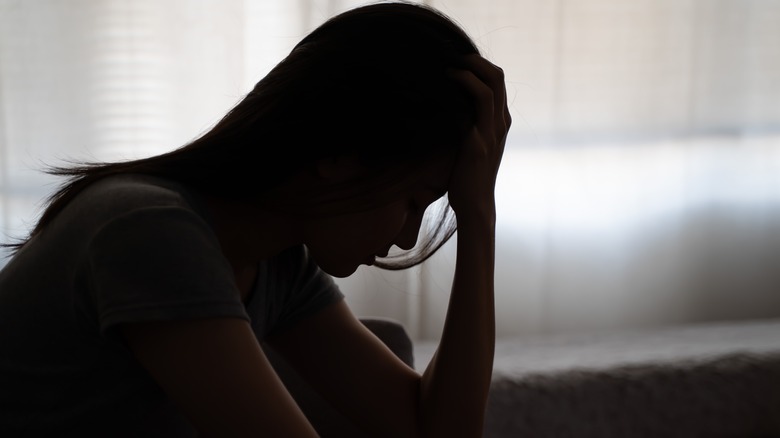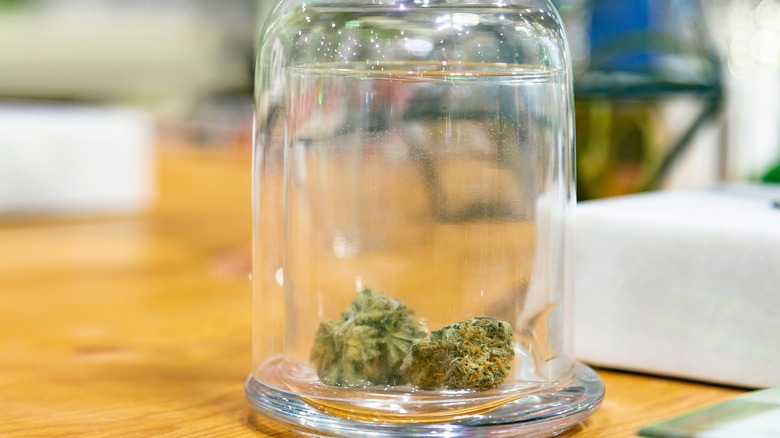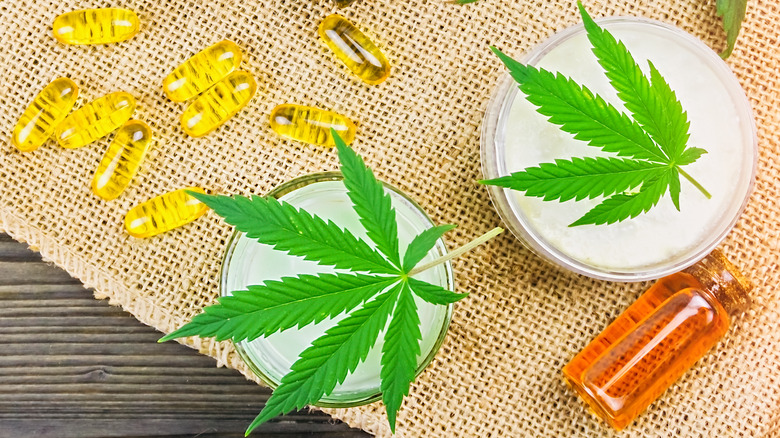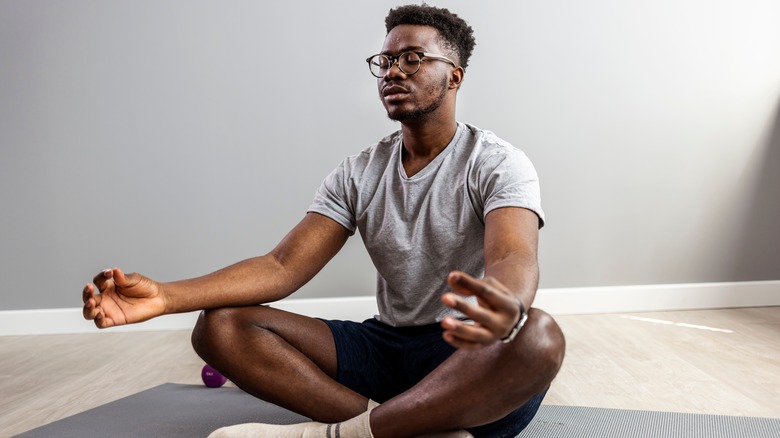Does Marijuana Make Anxiety Better Or Worse?
Marijuana is often thought of as a depressant, as many people report feelings of relaxation, laughter, slowed reaction time, and even euphoria when using the drug (per National Institute on Drug Abuse). But did you know that marijuana is also categorized as a stimulant (per The Journal of General Psychology)? For this reason, smoking marijuana can have mixed outcomes for people using it to cope with feelings of stress or anxiety.
In a close examination of thousands of studies, the National Academies of Sciences, Engineering, and Medicine determined that the compounds found in marijuana are an effective means of relieving chronic pain. Therefore, it is sometimes medically prescribed to individuals diagnosed with painful cancers (via Medical News Today). Researchers also found evidence to indicate that marijuana may have the potential to help combat other substance use disorders, such as opioid addiction.
Whether used recreationally or medicinally, some people also feel that smoking marijuana is a helpful means of calming nerves and anxiety. But is the drug really soothing our anxiety or simply ramping it up? Here's what the science tells us.
Low doses of THC may reduce anxiety
Delta-9-tetrahydrocannabinol — commonly referred to as THC — is the chemical that produces the psychoactive effects of marijuana. A 2017 literature review published by the University of Washington found that THC has the potential to lower anxiety levels when taken in small doses. The review referenced one study in particular in which participants underwent a psychosocial stress task. Those who received a small 7.5-milligram dose of THC experienced negative emotional responses to the task for a shorter amount of time than individuals who received higher doses of THC. In hindsight, these participants also reported the task to have been less threatening and less challenging than those who received higher THC doses did.
The science behind this physiological response is thought to be related to the body's endocannabinoid system. When smoking marijuana, the brain experiences a boost in the activation of cannabinoid and oxytocin receptors, as well as increased dopamine. Both oxytocin and dopamine fall into the category of "happy hormones," reports Healthline, meaning that these chemicals have the ability to elevate our mood.
High doses of THC may boost anxiety
While the literature review suggests potential anxiety-lowering effects associated with low-dose marijuana use, researchers found the opposite to be true when it came to higher doses of THC. In the same psychosocial stress task study, individuals who were given 12.5 milligrams of THC experienced increases in feelings of anxiety, distress, and negative mood before and during the task in comparison to those who had been given only 7.5 milligrams of THC. Increases in these negative emotions were minor, yet still substantial, the researchers noted.
Researchers also identified a series of risk factors associated with the likelihood of increased anxiety due to marijuana use. Such factors included genetics, personality traits, infrequent use, high THC doses, history of anxiety, and the diagnosis of anxiety disorders, among others.
The Center for Treatment of Anxiety and Mood Disorders states that THC has the ability to prompt the fear response in the brain, which is why some people report feelings of paranoia after usage. Though further research is still needed on the subject, some studies indicate a link between marijuana use and increased rates of suicide (via Anxiety.org). Those who use marijuana over extended periods of time have also been found to be particularly susceptible to other psychiatric disorders, such as depression, psychosis, or schizophrenia.
Is CBD more effective at combating anxiety?
While the effects of marijuana on anxiety levels may be different from person to person, the 2017 literature review points to an alternative that may potentially be more effective: cannabidiol (CBD). Containing only a minor fraction of THC, hemp-based CBD products are restricted to a 0.3% THC content or less by the federal government (via Cleveland Clinic). Past research has demonstrated that ingesting anywhere from 300 milligrams to 600 milligrams of CBD lessened experimentally-induced anxiety levels in people who had not been diagnosed with an anxiety disorder, as well as in patients specifically diagnosed with social anxiety disorder. A 2015 research paper published in the scientific journal Neurotherapeutics suggests that the potential benefits of CBD may extend even further to include those with generalized anxiety disorder (GAD), panic disorder, obsessive-compulsive disorder (OCD), and post-traumatic stress disorder (PTSD).
However, the concept of CBD usage for the treatment of mental health disorders is still new. Research around the subject is currently quite limited and largely self-reported. At this time, there is no definitive evidence to confirm that CBD helps to reduce anxiety.
Alternative methods for alleviating anxiety
The side effects of marijuana usage are not universal. Whether individuals feel it increases or decreases anxiety will vary greatly. Given this uncertainty, Dr. Joel Minden, a contributing writer for Psychology Today, has some suggestions for those who may be looking to cope with anxiety in alternate ways. "It's important to be able to work through challenges rather than avoiding them" or using marijuana "to feel better when things seem overwhelming," Dr. Minden said via the publication. "That might work in the short term, but in the long term, it's not a very effective strategy." Instead, Dr. Minden encourages practicing meditation, eating a healthy diet, getting regular exercise, and seeking out meaning and purpose in our personal lives as more effective means of relieving anxiety by establishing ongoing healthy habits.
If you, or anyone you know, is struggling with addiction issues, help is available. Visit the Substance Abuse and Mental Health Services Administration (SAMHSA) website or contact SAMHSA's National Helpline at 1-800-662-HELP (4357).





